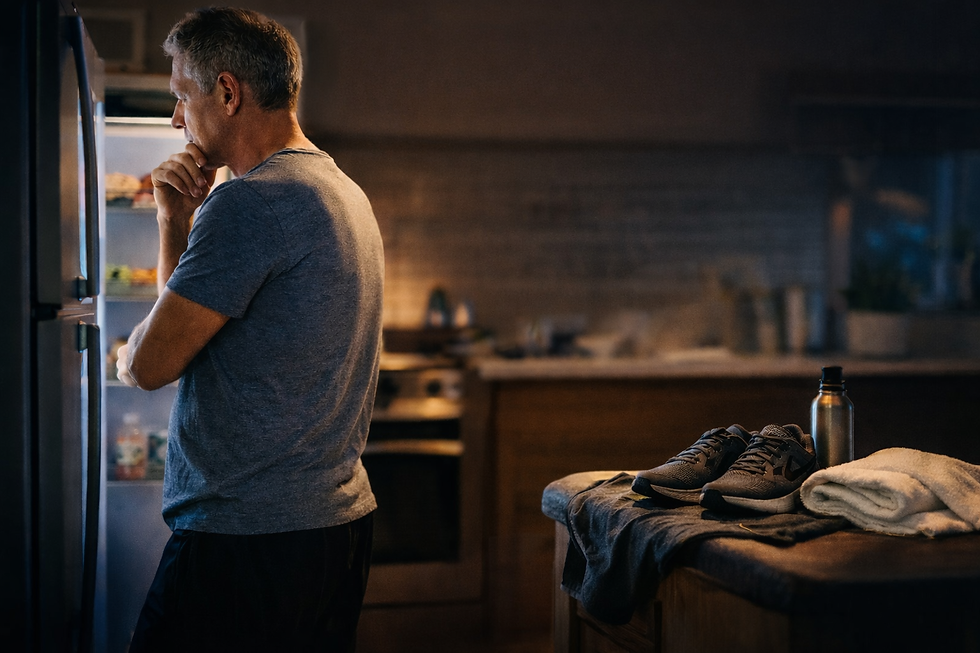Life Performance Blog: Veg Consumption & Your Health
- Chris Deavin
- Feb 12, 2021
- 3 min read

To improve on your vegetable choices, first aim for variety in colours
Then, to keep levelling up, below are a few more criteria to consider on creating your own continuum for eating "better" vegetables.
What's your current decision-making criteria for choosing vegetables?
Vegetables can be assessed based on:
What's nutritionally better
What's personally better, for your lifestyle and deep health
What makes a vegetable nutritionally "better"?
Nutritional quality
Better vegetables are a variety of vibrant colours. More vibrant-coloured vegetables are a sign of their richness of nutrients. Getting a variety of colours is a simple way to ensure a variety of nutrients.
For example, one way to maximize colour and nutritional vibrancy is to choose vegetables that are grown locally, to reduce time spent in transportation when nutrients could be degrading.
Better vegetables have fewer (or zero) pre-added ingredients. They'll get to you with fewer things like salt, sugar, sweeteners or sauces. Those delicious details can be finishing touches, freshly added by yourself or a trusted chef, rather than pre-packaged together.
If a vegetable in the produce aisle or at farmers' market comes without packaging, that's a clear sign it's a single-ingredient food.
If they do have added ingredients, better vegetables have higher-quality ingredients.
For example, if there are pre-added ingredients on the ingredient label of a vegetable item, choose foods with ingredient names that you recognize and that are adding value for you.
Higher-quality ingredients could be healthier oils like olive oil or avocado oil instead of soybean oil or hydrogenated oils. Lower-quality ingredients are non-nutritional additives like preservatives, colours, and artificial sweeteners. You can find better alternative vegetable items that include fewer of those ingredients.
Better vegetables are fresh and closer to the source. They have less transportation and processing to change them from the form they were in when they were picked, to the form they're in when you eat them.
What makes your vegetables personally "better", for your lifestyle and deep health?
Below are some more criteria for assessing how any particular vegetable is right in relationship to you, your life, and all dimensions of deep health.
Your food choices can interact with any or all of these dimensions. For example:
Better vegetables interact well with the unique biology of your body, based on your genetics, preferences, and food intolerances or allergies. Some vegetables are harder for some people to digest than other vegetables.
For example, raw broccoli and Brussels sprouts may cause feelings of gas or bloating in some people.
Better vegetables are ones that are easily accessible to you. They don't require exhausting mental effort or unreasonable amounts of time to get, plan and prep. You can fit the food within your lifestyle consistently, relatively effortlessly.
For example, some factors to consider are:
Easy access to have the food available when you want it
Time and effort to prep, cook, and store
Alternatively, better vegetables can be ones that challenge your mental creativity to explore and be adventurous with your food. You decide how your food choices fit your lifestyle and priorities.
Better vegetables are ones that you like, simply. Your personal preferences matter, no matter what the rationale. Better vegetables are ones that you enjoy and help you feel grounded, connected, and purposeful in your choices.
For example, maybe a better vegetable for you is one that's creative, exotic, unfamiliar and fun.
Better vegetables follow more natural growing methods. They have fewer potentially hazardous chemicals added to their supply chain.
For example, certified organic is the most widely adopted growing practice to support the foods' natural ecology. Vegetables that are certified organic is one way to know that they were grown with fewer synthetic pesticides and fertilizers. Organic certification isn't the only indicator of environmental stewardship. If you have access to a farmers' market, you could speak with the stewards directly on how they incorporate environmental sustainability into their growing practices.
Better vegetables move you towards your goals. Food can change between "better" and "worse" depending on what you want it to achieve for you in the moment.
For example, if you're eating an extremely low-carb diet, you may want to avoid starchier vegetables like potatoes and squash. If you're eating an extremely low-fat diet, starchier vegetables may help you feel more satisfied from food while meeting your other nutritional goals.
Keep thinking on a continuum. Think of the criteria above as a general guide to give context to your decision-making, rather than a definitive checklist.
Following those criteria towards "better" will help you get the most benefit from vegetables, with the least amount of unwanted side effects. And keep enjoying it while you do it.
Chris, myHealthCoach



Comments